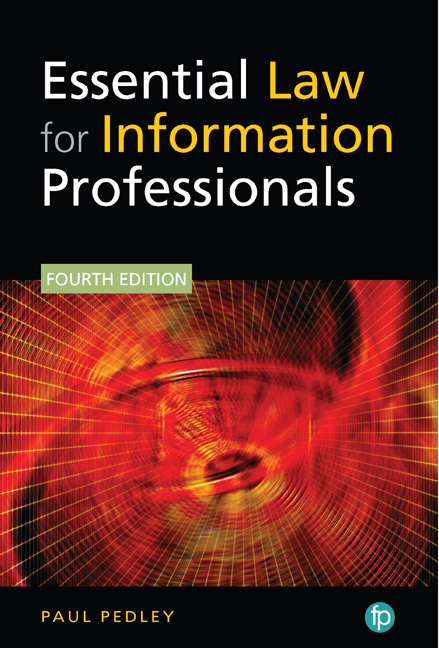Book contents
- Frontmatter
- Dedication
- Contents
- Disclaimer
- List of Figures and Tables
- Table of Statutes, Etc.
- Table of Cases
- Abbreviations
- Glossary of Terms
- Preface
- Chapter 1 General law and background
- Chapter 2 Library Law
- Chapter 3 Copyright
- Chapter 4 Legal Deposit
- Chapter 5 Breach of Confidence
- Chapter 6 Contracts and Licensing Agreements
- Chapter 7 Data Protection
- Chapter 8 Privacy
- Chapter 9 Freedom of Information
- Chapter 10 Human Rights
- Chapter 11 Re-use of Public Sector Information
- Chapter 12 Defamation
- Chapter 13 Professional Liability
- Chapter 14 Cybersecurity and Cybercrime
- Chapter 15 Disability Discrimination
- Chapter 16 Other Legal Issues Relevant to Librarians
- References
- Appendix 1 Brexit and the Orphan Works Exception
- Appendix 2 CILIP'S Ethical Framework
- Index
Chapter 15 - Disability Discrimination
Published online by Cambridge University Press: 27 March 2020
- Frontmatter
- Dedication
- Contents
- Disclaimer
- List of Figures and Tables
- Table of Statutes, Etc.
- Table of Cases
- Abbreviations
- Glossary of Terms
- Preface
- Chapter 1 General law and background
- Chapter 2 Library Law
- Chapter 3 Copyright
- Chapter 4 Legal Deposit
- Chapter 5 Breach of Confidence
- Chapter 6 Contracts and Licensing Agreements
- Chapter 7 Data Protection
- Chapter 8 Privacy
- Chapter 9 Freedom of Information
- Chapter 10 Human Rights
- Chapter 11 Re-use of Public Sector Information
- Chapter 12 Defamation
- Chapter 13 Professional Liability
- Chapter 14 Cybersecurity and Cybercrime
- Chapter 15 Disability Discrimination
- Chapter 16 Other Legal Issues Relevant to Librarians
- References
- Appendix 1 Brexit and the Orphan Works Exception
- Appendix 2 CILIP'S Ethical Framework
- Index
Summary
General principles
Disabled people are among the most excluded in society. They encounter many barriers to accessing the services of archives and libraries, including physical, sensory, attitudinal, cultural and intellectual ones. Library and information services need to ensure that they do not discriminate against those who are disabled. This is not solely a moral issue. The Equality Act 2010 makes the fair treatment of disabled people a legal requirement.
According to the definition of ‘disability’ under the Equality Act 2010 (section 6) a person has a disability if they have a physical or mental impairment and if the impairment has a substantial and long-term adverse effect on their ability to perform normal day-to-day activities. For the purposes of the Act, ‘substantial’ means more than minor or trivial (section 210 general interpretation); ‘longterm’ means that the effect of the impairment has lasted or is likely to last for at least twelve months (Schedule 1 Part 1 section 2); and ‘normal day-to-day activities’ include everyday things such as eating, washing, walking and going shopping.
Discrimination against disabled people can take place in either of two ways, by:
• Treating them less favourably than other people because of a protected characteristic (EA 2010 section 13(1)).
• Failing to make a reasonable adjustment (EA 2010 sections 20–21) when they are placed at a ‘substantial disadvantage’ compared to other people for a reason relating to their disability.
The characteristics that are protected are:
• Age.
• Disability.
• Gender reassignment.
• Pregnancy and maternity.
• Race.
• Religion or belief.
• Sex.
• Sexual orientation.
Marriage and civil partnership are also protected characteristics under the Act but are not covered by the public sector equality duty.
A reasonable adjustment might be any action that helps to alleviate a substantial disadvantage. This could involve changing the organisation's standard procedures; providing materials in Braille as an additional service; providing appropriate adjustments to the physical environment; or training staff to work with disabled people.
People with disability can include those with physical or mobility impairments; hearing impairments; dyslexia; medical conditions; mental health difficulties; visual impairment; or people with learning difficulties.
- Type
- Chapter
- Information
- Essential Law for Information Professionals , pp. 305 - 318Publisher: FacetPrint publication year: 2019



